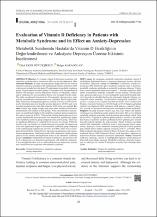| dc.contributor.author | Eker Büyükşireci, Dilek | |
| dc.contributor.author | Karaoğlan, Belgin | |
| dc.date.accessioned | 2021-11-01T18:19:10Z | |
| dc.date.available | 2021-11-01T18:19:10Z | |
| dc.date.issued | 2021 | |
| dc.identifier.citation | Eker Büyükşireci, D., & Karaoğlan, B. (2021). Evaluation of Vitamin D Deficiency in Patients with Metabolic Syndrome and its Effect on Anxiety-Depression. Journal of Physical Medicine & Rehabilitation Sciences/Fiziksel Tup ve Rehabilitasyon Bilimleri Dergisi, 24(1). | en_US |
| dc.identifier.issn | 1309-3843 | |
| dc.identifier.issn | 1307-7384 | |
| dc.identifier.uri | https://doi.org10.31609/jpmrs.2020-77742 | |
| dc.identifier.uri | https://app.trdizin.gov.tr/makale/TkRJM05qTTVPUT09 | |
| dc.identifier.uri | https://hdl.handle.net/11491/8295 | |
| dc.description.abstract | T Objective: To evaluate vitamin D deficiency in patients with metabolic syndrome and to examine its effect on anxiety-depression. Ma?terial and Methods: Seventy one participants diagnosed with and without metabolic syndrome according to the International Diabetes Federation 2005 criteria were included into the study (35 participants in metabolic syndrome group, 36 participants in control group). Participants with rheumatological disease, fibromyalgia, anxiety-depression, history of orthopedic surgery and/or medication for any psychiatric illness were excluded from the study. The study was planned retrospectively. Demographic characteristics, waist and hip circumference measurement were examined. Blood triglyceride, HDL cholesterol, fasting plasma glucose, vitamin D levels, systolic and di?astolic blood pressures and hospital anxiety-depression (HAD) scale were recorded retrospectively at the date when the HAD scale were applied. Re?sults: Gender, age, height, weight, body mass index and hip circumference measurement were similar in both groups. Waist circumference measure?ment was significantly higher in the metabolic syndrome group compared to the control group (p=0.031). Triglyceride, fasting plasma glucose level, systolic and diastolic blood pressure were found to be significantly higher in the metabolic syndrome group compared to the control group. There was no significant difference in vitamin D level between two groups. While the anxiety score was found to be similar between two groups, the depression score was significantly higher in the metabolic syndrome group compared to the control group (respectively; p=0.917, p=0.008). There was no corre?lation between blood vitamin D level and waist circumference, hip circum?ference measurements, blood triglyceride, HDL cholesterol, fasting plasma glucose levels, anxiety and depression scores in the metabolic syndrome group. Conclusion: Independent of vitamin D deficiency, an increase in the level of depression was detected in participants with metabolic syndrome. It was thought that there was no relationship between depression, anxiety and vitamin D levels in patients with metabolic syndrome. | en_US |
| dc.description.abstract | Amaç: Bu çalışmada, metabolik sendromlu hastalarda vitamin D eksikliğinin değerlendirilmesi ve anksiyete-depresyon üzerine etkisinin incelenmesi amaçlandı. Gereç ve Yöntemler: Uluslararası Diyabet Fe?derasyonu 2005 kriterlerine göre metabolik sendromu olan 35 katılımcı, metabolik sendromu grubunda ve metabolik sendromu olmayan 36 katı?lımcı, kontrol grubunda olmak üzere toplam 71 katılımcı çalışmaya dâhil edildi. Romatolojik hastalığı, ortopedik cerrahi öyküsü, fibromiyaljisi olan, anksiyete-depresyon ve/veya herhangi bir psikiyatrik hastalık nede?niyle ilaç tedavisi altındaki katılımcılar çalışmadan dışlandı. Çalışma, ret?rospektif olarak planlandı. Katılımcıların demografik özellikleri, bel çevresi ve kalça çevresi ölçümü kayıtları incelendi. Tüm katılımcıların Hastane Anksiyete-Depresyon (HAD) ölçeği ve HAD ölçeği uygulandığı tarihteki kan trigliserid, HDL kolesterol, açlık glukozu, vitamin D düzey?leri, sistolik ve diyastolik kan basınçları retrospektif olarak kaydedildi. Bulgular: İki grup arasında cinsiyet, yaş, boy, kilo, beden kitle indeksi ve kalça çevresi ölçümü açısından anlamlı fark yoktu. Bel çevresi ölçümü metabolik sendrom grubunda, kontrol grubuna göre anlamlı olarak fazla idi (p=0,031). Trigliserid, açlık kan glukozu düzeyi, sistolik ve diyastolik kan basıncı metabolik sendrom grubunda kontrol grubuna göre anlamlı derecede yüksek saptandı. İki grup arasında vitamin D düzeyi açısından anlamlı fark saptanmadı. Anksiyete skoru 2 grup arasında benzer sapta?nırken, depresyon skoru metabolik sendrom grubunda kontrol grubuna göre anlamlı derece yüksek saptandı (sırasıyla; p=0,917, p=0,008). Meta?bolik sendromu olan grupta vitamin D düzeyi ile bel çevresi, kalça çevresi, trigliserid düzeyi, HDL kolesterol düzeyi, açlık kan şekeri, anksiyete ve depresyon skorları arasında korelasyon saptanmadı. Sonuç: Metabolik sendromu olanlarda, vitamin D eksikliğinden bağımsız olarak depresyon düzeyinde artış olduğu saptandı. Metabolik sendromu olanlarda, depres?yon ve anksiyete ile vitamin D düzeyleri arasında ilişki olmadığı düşü?nüldü. | en_US |
| dc.language.iso | eng | en_US |
| dc.relation.ispartof | Fiziksel Tıp ve Rehabilitasyon Bilimleri Dergisi | en_US |
| dc.rights | info:eu-repo/semantics/openAccess | en_US |
| dc.subject | Vitamin D Deficiency | en_US |
| dc.subject | Metabolic Syndrome | en_US |
| dc.subject | Anxiety-depression | en_US |
| dc.subject | Vitamin D | en_US |
| dc.subject | Metabolik Sendrom | en_US |
| dc.subject | Anksiyete-depresyon | en_US |
| dc.title | Evaluation of Vitamin D Deficiency in Patients with Metabolic Syndrome and its Effect on Anxiety-Depression | en_US |
| dc.title.alternative | Metabolik Sendromlu Hastalarda Vitamin D Eksikliğinin Değerlendirilmesi ve Anksiyete-Depresyon Üzerine Etkisinin İncelenmesi | en_US |
| dc.type | other | en_US |
| dc.department | Hitit Üniversitesi, Tıp Fakültesi, Dahili Tıp Bilimleri Bölümü | en_US |
| dc.authorid | Eker Büyükşireci, Dilek / 0000-0002-5420-7563 | |
| dc.authorid | Karaoğlan, Belgin / 0000-0001-6493-3617 | |
| dc.identifier.volume | 24 | en_US |
| dc.identifier.issue | 1 | en_US |
| dc.identifier.startpage | 23 | en_US |
| dc.identifier.endpage | 26 | en_US |
| dc.relation.publicationcategory | Diğer | en_US |
| dc.department-temp | Hitit Üniversitesi, Erol Olçok Eğitim ve Araştırma Hastanesi, Fiziksel Tıp ve Rehabilitasyon Kliniği, Çorum, Türkiye;Gazi Üniversitesi, Tıp Fakültesi, Fiziksel Tıp ve Rehabilitasyon Anabilim Dalı, Ankara, Türkiye | en_US |
| dc.contributor.institutionauthor | Eker Büyükşireci, Dilek | |
| dc.identifier.doi | 10.31609/jpmrs.2020-77742 | |


















